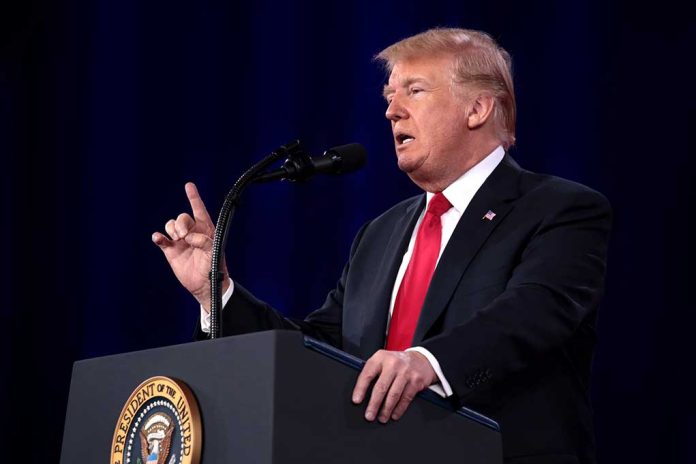
merThe growing tension between President Trump and the judiciary highlights a critical moment in U.S. constitutional governance, probing the limits of judicial authority against executive power.
Key Takeaways
- President Trump argues nationwide injunctions by judges overextend into areas beyond their jurisdiction.
- Calls from Trump’s administration and supporters suggest possible impeachment for judges opposing their policies.
- Judges have rebuked these challenges, citing the need for judicial independence.
- Comparisons made to actions by global populist leaders targeting their own judiciaries.
Contentious Power Struggle
President Donald Trump has sharply criticized radical left judges who have issued nationwide injunctions against his administration’s policies. His critique centers on claims of judicial overreach, suggesting these actions infringe upon presidential authority as described in Article II of the U.S. Constitution. This marks an unprecedented tension in the historical context of U.S. government checks and balances. Many fear a tipping point towards constitutional crises, potentially mirroring actions seen in other nations led by populist figures.
Many MAGA patriots argue that such judicial decisions are politically motivated and harm national governance and security. Prominent figures within the administration, including Trump’s Deputy Chief of Staff, Stephen Miller, have voiced concern over the judicial authority exercised in these contexts. Last year, some Trump-aligned members of Congress suggested impeachment for these ruling judges, but the procedural requirements of the Senate make such removals unlikely.
Judicial Independence Under Siege
Despite the heated rhetoric, Trump’s administration has not outright defied judicial orders but has instead pursued appeal processes for unfavorable decisions. Concerns about judicial independence echo through various circles, warning of a constitutional crisis. Legal experts warn of a potential threat to judicial independence, emphasizing the importance of legal norms and the judiciary’s role in balancing the executive branch’s authority. Republican-appointed judges and legal experts have spotlighted similar concerns, sparking debate about oversight versus overreach.
Elon Musk has weighed in via his platform X, advocating for the removal of judges who issue such injunctions. This incident has reminded the public of historical figures who cautioned against uncontrolled judicial power. Chief Justice John Roberts openly reminded the public and President Trump that impeachment is not a suitable response to judicial disagreement. His reassurance underscores the channels available for contesting decisions—appellate reviews still stand as pillars of U.S. judicial practices.
Historic Precedents and Global Comparisons
Examining past presidencies reveals that policy checks by the judiciary are not new. However, the current climate of executive disapproval directed at these checks is distinct. Legal experts refer to global examples where similar judicial attacks have restraints revealed by leaders like Hungary’s Viktor Orbán and Brazil’s Jair Bolsonaro. Experts remain concerned that intensifying rhetoric against judges may tarnish America’s image as a beacon of democracy and establish a precarious precedent regarding the rule of law.
Unlawful Nationwide Injunctions by Radical Left Judges could very well lead to the destruction of our Country! These people are Lunatics, who do not care, even a little bit, about the repercussions from their very dangerous and incorrect Decisions and Rulings. Lawyers endlessly…
— Donald J. Trump Posts From His Truth Social (@TrumpDailyPosts) March 20, 2025
This controversy underscores a broader sentiment prevalent among Americans. The pushback against perceived overreach speaks to larger questions about the distribution of power within the U.S. government and its preservation. As this contentious struggle unfolds, it poses significant concerns for the future of American jurisprudence and the sustained balance of governmental power.
Sources:
- Trump administration ramps up rhetoric targeting the courts amid mounting legal setbacks – ABC News
- Trump’s pushback on judges challenges U.S. system of checks and balances | PBS News
- Trump Takes a Blowtorch to These Rogue Judges Trying to Thwart the Will of the People



